We made this guide to help you find the best fuel injector cleaner for your car and step up your car maintenance game. Is your car taking longer to start? Does gas mileage vary from gas station to gas station to gas station? Do you get a “clunky” feel once you step on the gas pedal? If the answer to one or more of these questions is “Yes,” do not panic! People make an extreme reaction to these problems. Either they ignore the issues altogether, or they raise the alarm immediately. That’s when fuel injector cleaners come into play.
“What is that?” – You might ask. Well, stick around and find out how simple internal cleaning can boost your car’s performance in an instant. After that, feel free to go through our picks, and read our fuel injector cleaner reviews.
See The Quick Comparison Chart
Benefits of Fuel Injector Cleaners
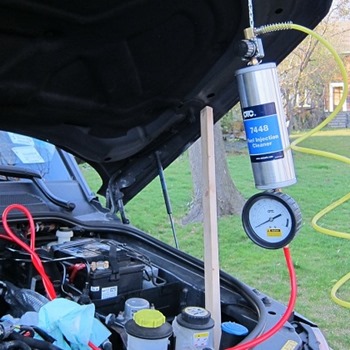 It seems easy to insist on “car health” and “regular maintenance” all the time. But what are the real upsides of fuel injector cleaning? While the problems of a neglected fuel injecting system are hard to count, we nailed down the benefits, as they are for the most part practical, and on the other hand, they have something to do with the environment. Let’s dive in and see what kind of advantages do clean fuel injectors bring!
It seems easy to insist on “car health” and “regular maintenance” all the time. But what are the real upsides of fuel injector cleaning? While the problems of a neglected fuel injecting system are hard to count, we nailed down the benefits, as they are for the most part practical, and on the other hand, they have something to do with the environment. Let’s dive in and see what kind of advantages do clean fuel injectors bring!
1. Lubrication Through Cleanliness
People often forget that a car engine is an extremely complicated device full of moving metal parts. While fuel injector cleaners do not lubricate the engine directly, they do contribute to overall friction removal. Over time, due to constant aggressive movement, engine parts leave a fair amount of microscopic sheet metal. This debris tends to accumulate inside the fuel injectors, and that pile of micro-metal gets bigger with every gallon of fuel that gets through.
Manufacturers of fuel injector cleaners had that in mind and adjusted every formula to tackle those metal aggregates and remove them entirely. With less clogging material, everything is bound to run more smoothly, and more importantly, the engine becomes more efficient.
2. Fuel Efficiency
When we say engine efficiency, two things come to mind: horsepower and fuel efficiency. Now, if significant HP increase is what you seek, we recommend investing in some octane boosters, because they are a scientifically proved way to go. However, if you are seeking for better MPG (miles per gallon), then clean fuel injectors are the key! The math is pretty simple actually:
- The engine needs an air-fuel mix to combust and run efficiently
- Dirty fuel injectors cannot provide enough of that mix, so the car starts pumping more, so more fuel is burned for the same (or sometimes even weaker) performance
- Clean fuel injectors promote better fuel circulation and make sure that every drop of fuel is used properly
The longer the fuel injectors run dirty, the more fuel your car wastes struggling to make up for it. With clean nozzles, you allow your car’s engine to pump the correct amount of fuel into the system, thus making it perform better while getting the unwanted stuff through the exhaust.
3. Environmental Factors
Every country on the planet is aiming towards the decrease of harmful gas emissions, and cars are not an exception. While fuel injector cleaners will not make your car’s exhaust gases absolutely clean, they will help your vehicle achieve a higher level of eco-friendliness.
Firstly, by making the engine use the right amount of fuel instead of burning more and more of it, your car will exhaust less harmful gases into the environment. It may not sound like a lot, but burning less fuel for the same performance is the goal we should aim for. Less fuel burned equals less gas let into the environment.
The second feature that helps reduce gas emissions is directly connected to the dirt that accumulates inside the fuel injectors, or rather the lack of it. Dirty injectors have been found guilty of adding more harmful gases to the exhaust mix. This happens simply due to the fact that dirty injectors start pumping more rust and fuel dirt over time. By destroying that dirt, fuel injector cleaners directly lower harmful gas emissions.
This eco-friendly feature may not seem like a lot, but if every vehicle owner kept his car’s fuel injectors clean, you would be surprised by the power of cumulative effect that would cause.
When Should You Use Injector Cleaners?
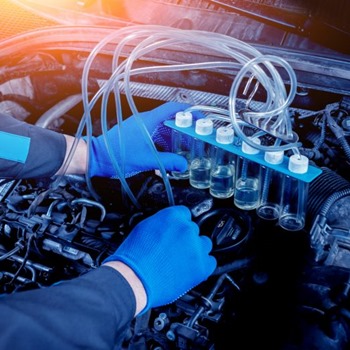 Considering that we now covered what fuel injectors are, and what they can do when they are adequately cleaned, it is time to learn about the symptoms and the correct timing to clean them. The more experienced you get, the easier is the diagnosis process. We would like to pass onto you the most common symptoms of dirty and or clogged fuel injectors. There is no doubt that if you want to keep your car in good condition, you will have to “listen” to it. Here, we will propose some of the main signs that it is time for a fuel injection cleaning.
Considering that we now covered what fuel injectors are, and what they can do when they are adequately cleaned, it is time to learn about the symptoms and the correct timing to clean them. The more experienced you get, the easier is the diagnosis process. We would like to pass onto you the most common symptoms of dirty and or clogged fuel injectors. There is no doubt that if you want to keep your car in good condition, you will have to “listen” to it. Here, we will propose some of the main signs that it is time for a fuel injection cleaning.
1. Gas Meter is Acting Up
The very first sign of a dirty fuel injector is inconsistent MPG. If your vehicle doesn’t have an MPG analyzer on board (which most cars don’t’), there is a simple test you can do to check on your own. All you need is a little patience. So, here’s the method:
- Pick a route that you travel often. This can be a work/school commute, or a weekly grocery shop drive
- Every time you start the drive, make a note of how much gas you have in the car
- Every time you finish the route (try to finish at the same spot) take a not of the gas tank, and calculate the difference – gas spent on the trip
- Revisit the notes after 5 to 10 trips, and see if the fuel consumption varies by a lot. If the answer is “yes,” you might have dirty fuel injectors on your hands.
Keep in mind that this method may be misleading due to other factors that can affect MPG. Wrong tire pressure, exhaust problems, fuel pump problems, etc. these can all leave a mark on the gas mileage. However, if you manage to rule them out, or you are sure that they are not the problem, fuel injectors are due for a cleaning. After all, we are going to talk about several symptoms, and if you notice a combination of two or more, well the likelihood of injector dirt is bigger.
2. Engine Start Takes a Moment or Two
You had your breakfast and morning coffee, and now it is time to go to work. You get into your car, turn the key. Nothing happens. You give it another turn or two, and then it starts. Delayed engine start may be caused by a lot of reasons, with the spark plugs being the main one. However, if you are sure that the plugs are in good condition, the chances are that the fuel injectors are clogged.
Forcing the engine to start will work for some time, but if dirty fuel injectors are the case, a fuel injector cleaner is your best friend.
3. The Engine Has “Misfires”
We have all witnessed an engine misfire. It is not pleasant, and it often points towards a more serious issue, next to the obvious noise problem. When your car’ cylinders are not working (or firing) in sync correctly, the engine performances start to drop. Some users experience the so-called hiccups, and some can clearly hear the cylinder misfire.
If this happens, and you managed to rule out other issues, there is a huge possibility that the fuel injectors are clogged up. In this case, your engine struggles to get the necessary air-fuel mix it needs for combustion. Sometimes, you can even see physical signs of an injector clogging up under the hood. There will be fuel stains all over due to the injectors’ inability to pass and aerate the fuel mix.
Clogged up injectors are the last stage before their collapse. It sounds dangerous, and it is, but it is not the end of the world. Most fuel injector cleaner formula today is strong enough to tackle even the hardest of aggregates. This complete stuffing of the injector nozzle happens not only because of the filth found inside the fuel but because of the rust too. The corrosion process begins because the water from burning fuel reacts with the interior walls of the car parts, thus making micro rust particles.
4. Car Was in the Garage for a While
Lastly, what people usually overlook is the fuel instability that occurs after a longer period of rest. Being that you were not able to drive for a few months, or you parked your car for the winter, one thing is for certain: the fuel will get dirty! While resting fuel destabilizes and releases all sorts of unwanted materials, including oxygen that catalyzes corrosion inside your car.
After the resting period passes, drain the old fuel and run a fuel injector cleaner through the system. Nowadays, fuel’s stability is sacrificed for the sake of ecology, and unstable fuel deteriorates faster, leaving potential damages behind. Get a step ahead and clean the car’s fuel injection system before you start driving again.
Best Fuel Injector Cleaners Comparison Chart
| PRODUCT | DETAILS | ||
|---|---|---|---|
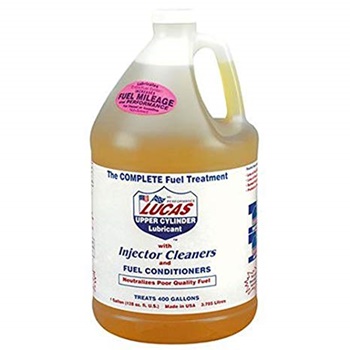 | LUCAS LUC10013 Fuel Treatment |
| View On Amazon |
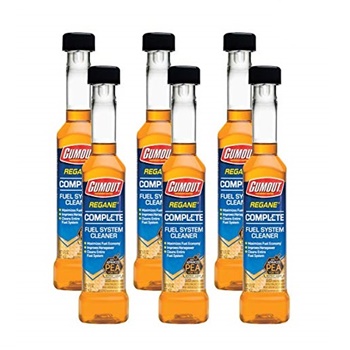 | Gumout 510014 Regane Complete Fuel System Cleaner |
| View On Amazon |
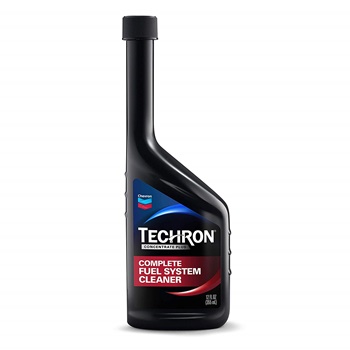 | Chevron Techron Concentrate Plus Fuel System Cleaner |
| View On Amazon |
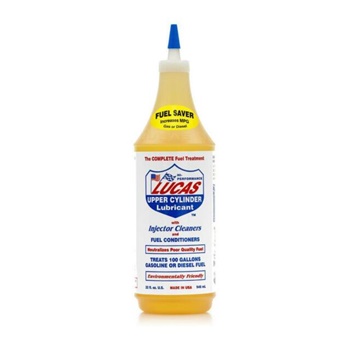 | Lucas 10003 Upper Cylinder Lubrication & Injector Cleaner |
| View On Amazon |
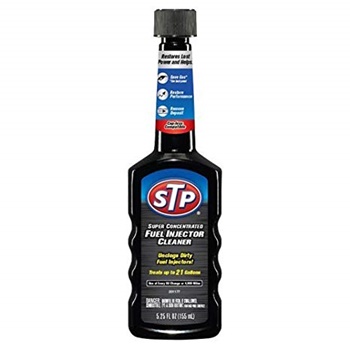 | STP 78577 Bottles Super Concentrated Fuel Injector Cleaner |
| View On Amazon |
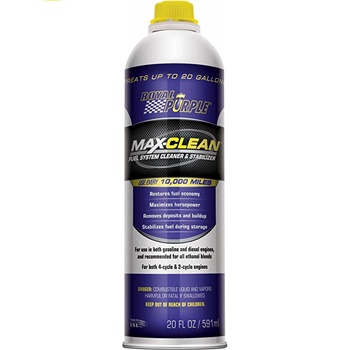 | Royal Purple Max-Clean Fuel System Cleaner |
| View On Amazon |
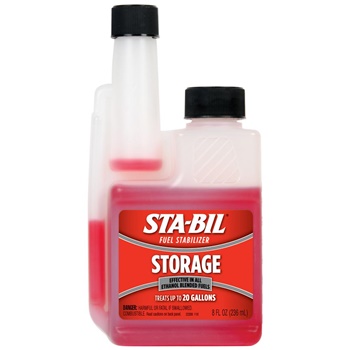 | STA-BIL 22208 Fuel Stabilizer |
| View On Amazon |
Best Fuel Injector Cleaner Reviews
1. LUCAS LUC10013 Fuel Treatment
 Here we have a fuel injector cleaner that comes in a larger package but still brings the high-end performance. This 1-gallon pack brings more than just cleaning to the table. It is designed to enhance the overall performance of your vehicle. While it can support a lot of car models, it is not intended for every model out there, so make sure to double-check before you get it.
Here we have a fuel injector cleaner that comes in a larger package but still brings the high-end performance. This 1-gallon pack brings more than just cleaning to the table. It is designed to enhance the overall performance of your vehicle. While it can support a lot of car models, it is not intended for every model out there, so make sure to double-check before you get it.
Inside the formula of this injector cleaner, there is a potent detergent mix that will help get all the accumulated carbon and dirt out of the fuel-injecting system. When it comes to diesel engines, this cleaner has the feature of lowering the sulfur concentration, which significantly decreases harmful gas emissions, all while boosting your car’s gas mileage.
Pros
- The fluid comes in a large package designed to hold enough cleaner for multiple cleaning sessions
- It has a formula that lowers the sulfur concentrations in diesel fuels
- Also acts as a lubricant for your car’s fuel injectors and carburetor
Cons
- The larger package will need additional storage space
- The fuel injector cleaner does not cover all car models, so make sure to double-check
2. Gumout 510014 Regane Complete Fuel System Cleaner
 Some manufacturers like to include separate doses for their fuel injector cleaners. Such is the case with this six-pack of Gumout, which comes in a 6 x 6 oz. package. They divided it like this for simplicity sake, and we love it. Each 6-oz. the bottle is enough for a single fuel system cleaning session. Yes, that’s right, this particular formula will penetrate into the whole fuel system and provide it with much-needed restoration.
Some manufacturers like to include separate doses for their fuel injector cleaners. Such is the case with this six-pack of Gumout, which comes in a 6 x 6 oz. package. They divided it like this for simplicity sake, and we love it. Each 6-oz. the bottle is enough for a single fuel system cleaning session. Yes, that’s right, this particular formula will penetrate into the whole fuel system and provide it with much-needed restoration.
The heavy-duty formula of this injector cleaning agent is there to provide several features besides the apparent cleaning one. So, next to the detergent that will clean the carbon and dirt deposits, you can also expect a fuel stabilizing effect that keeps the ethanol levels in check. Additionally, it will not damage the oxygen sensors, despite the aggressive formula inside.
Pros
- The convenient packaging of 6 bottles, each containing 6 oz. of the formula
- The cleaner is made for the entire fuel system and has corrosion and fuel-stabilization effects
- The formula is suitable for turbocharged and supercharged vehicles as well
Cons
- The bottles are smaller in volume, and each bottle covers only 3,000 miles
- Extra bottles need extra storage space
3. Chevron Techron Concentrate Plus Fuel System Cleaner
 This Chevron formula is one of the most popular fuel system cleaners out there. It comes in a neatly designed bottle for pouring directly into the fuel tank, containing a total of 20 oz. of fluid. This particular injector cleaner is designed to travel through the whole fuel system, cleaning the rust and carbon deposits along the way.
This Chevron formula is one of the most popular fuel system cleaners out there. It comes in a neatly designed bottle for pouring directly into the fuel tank, containing a total of 20 oz. of fluid. This particular injector cleaner is designed to travel through the whole fuel system, cleaning the rust and carbon deposits along the way.
The Techron covers all types of vehicles and vehicle engines (as long as they rely on internal combustion). The formula also works on fuel system maintenance and reduces engine surges and hiccups. The recommended dosage is one bottle every 3,000 miles, but reports have suggested that it can last even longer.
Pros
- One of the most popular choices worldwide
- An extremely convenient package that is designed for pouring directly into the fuel tank
- Has a wide variety of maintenance features that prevent the fuel system from further damages
Cons
- Users reported that the packaging is sometimes too hard to open, which can be a problem in emergencies.
- Does not have fuel stabilizers inside the formula, but that’s not a requirement for fuel injector cleaners anyway
4. Lucas 10003 Upper Cylinder Lubrication & Injector Cleaner
 Here we have a formula from Lucas that is designed for more than just fuel injector cleaning. As a matter of fact, this particular fluid is primarily engineered to provide cylinder lubrication. However, besides the intended use, the engineers at Lucas decided to mix a fuel injector cleaning agent into the mix as well. It comes in a 32 oz. bottle with an extension on top for easy pouring.
Here we have a formula from Lucas that is designed for more than just fuel injector cleaning. As a matter of fact, this particular fluid is primarily engineered to provide cylinder lubrication. However, besides the intended use, the engineers at Lucas decided to mix a fuel injector cleaning agent into the mix as well. It comes in a 32 oz. bottle with an extension on top for easy pouring.
This formula will help the engine to burn all the aggregated carbon dirt while lubricating the cylinders and keeping the carburetor clean as well. It fits both gasoline and diesel engines, with the addition of sulfur lowering features, which diesel engines benefit from the most.
Pros
- A multipurpose cylinder lubricant and fuel injector cleaner
- Penetrates even deeper, keeping the carburetor clean as well
- Lowers the overall sulfur levels in diesel fuels, reducing the harmful gas emissions
Cons
- Not suitable for people that look for a fuel system cleaner exclusively, due to the cylinder lubricating part of the formula
- The pouring tool on top is prone to breaking, so be extra careful
5. STP 78577 Bottles Super Concentrated Fuel Injector Cleaner
 If you are looking for a heavy-duty fuel injector cleaner, this STP duo pack might just be an excellent solution for your car. This pair of 5.25-oz. bottles are made with jet fuel for the extra kick, and it will keep the fuel system clean for a thousand miles per bottle.
If you are looking for a heavy-duty fuel injector cleaner, this STP duo pack might just be an excellent solution for your car. This pair of 5.25-oz. bottles are made with jet fuel for the extra kick, and it will keep the fuel system clean for a thousand miles per bottle.
Inside the formula, there are concentrated detergents that will tackle any accumulated carbon, gum and varnish reserves, dissolve them and make them exit the fuel system through the exhaust. The manufacturer recommends to use this formula every time before you refuel your car, but that can be a bit too much. The jet-fuel-based formula works it’s magic super-fast and effective.
Pros
- An active formula based on jet fuel that quickly starts working
- This fuel injector cleaner is suitable for both diesel and gasoline engines
- The cleaning formula will help keep various kinds of debris out (carbon, gum, varnish, etc.)
Cons
- The packages are rather small, and a single dose lasts for 1,000 miles only
- Some drivers report that the formula can be a little too aggressive, so use with caution
6. Royal Purple Max-Clean Fuel System Cleaner
 The Max-Clean is one of the most versatile formulas out there. It is a 3-in-1 formula that provides protection and removes hardened aggregates from the entire fuel system of your car’s engine. This 20 oz. bottle certainly has a lot to offer, especially to people that like to keep their vehicles in well-lubricated, healthy conditions.
The Max-Clean is one of the most versatile formulas out there. It is a 3-in-1 formula that provides protection and removes hardened aggregates from the entire fuel system of your car’s engine. This 20 oz. bottle certainly has a lot to offer, especially to people that like to keep their vehicles in well-lubricated, healthy conditions.
This 20 oz. will keep your car’s fuel system clean, lubricated and stable for about 10,000 miles total, which is excellent if you do not have time to perform maintenance often. The 3-in-1 formula will keep your car’s fuel system clean while reducing hydrocarbon, nitrogen oxide, and carbon monoxide emission levels. Additionally, the mix has an agent that prevents oxidation and corrosion of the fuel system’s insides.
Pros
- Formula with a 3-in-1 one solution that cleans lowers gas emissions and prevents corrosion
- The whole bottle protects the fuel injection system for 10,000+ miles
- This particular cleaner supports both 2-cycle and 4-cycle engines
Cons
- The can doesn’t come with a funnel or tube for easier pouring
- Some users report that the can tends to heat up fast, so make sure you store it in a secure place
7. STA-BIL 22208 Fuel Stabilizer
 This particular fluid has a specific purpose. It is designed to reawaken the engines and the fuel system after a long storage period. It primarily targets the fuel, stabilizing it and making the whole fuel system up and running again. It comes in an 8 oz. container that will be more than enough to revitalize your internal combustion engine, even if it’s a 2-cycle.
This particular fluid has a specific purpose. It is designed to reawaken the engines and the fuel system after a long storage period. It primarily targets the fuel, stabilizing it and making the whole fuel system up and running again. It comes in an 8 oz. container that will be more than enough to revitalize your internal combustion engine, even if it’s a 2-cycle.
The main feature of this fluid is to eliminate the need for fuel draining before storage. It will stabilize the fuel you left inside while removing water left after condensation. It also penetrates into the carburetor and fuel injectors quickly, protecting them from corrosion and rust accumulation. Ultimately, it prevents gum and varnish accumulation and keeps the fuel fresh for up to 24 months of storage.
Pros
- A powerful formula designed for convenience in the case of long-lasting vehicle storage
- Works both with 4-cycle and 2-cycle engines
- Up to 24 months of fuel and engine protection
Cons
- This formula is made for passive use, and not for a vehicle used every day
- Some drivers report that the formula is not stable for long by itself, so open the bottle when you decide to use it
What Do Fuel Injectors Do?
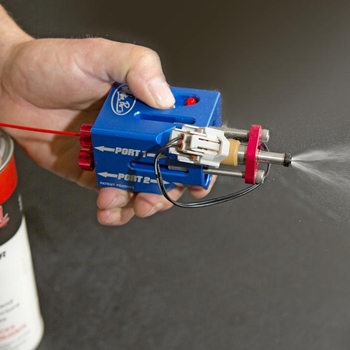 Without getting too much into the science of engines, we would like to take a minute and explain what fuel injectors actually are. After all, if you want to make the best out of this guide, and finally get the fuel injector cleaner your car deserves, there isn’t a better place to start. We promise not to get too technical.
Without getting too much into the science of engines, we would like to take a minute and explain what fuel injectors actually are. After all, if you want to make the best out of this guide, and finally get the fuel injector cleaner your car deserves, there isn’t a better place to start. We promise not to get too technical.
Fuel injectors are an essential part of a modern vehicle engine. No matter if we are talking about cars, airplanes or motorcycles, if there’s an internal combustion engine involved, there has to be a working set of fuel injectors. As you might know, the engine needs three things to work or combust if you prefer. It needs fuel (gas, diesel, etc.), air, and a spark to start the combustion process. Fuel injectors are there to make sure that the right amount of gas-air is mixed and provided to the engine. The right amount means enough to keep combusting, without shutting down or exploding.
Technically speaking, every drop of gas that you put inside your car has to go through the fuel injection system. And every type of gas or diesel has one have one thing in common. They’re dirty. Fuels of various types are mixes of combustible compounds that are not exactly the cleanest chemical soups out there.
So, if a fuel injector fails, the whole process of fuel combustion halts, or at least weakens by a large margin. Thankfully, the technology of today made it possible to solve simple fuel injector problems by yourself. But, what could those problems be?
Why Do You Need Fuel Injector Cleaners?
To be completely honest, there are plenty of reasons why you should keep your fuel injectors clean. If you want your car to run as it is supposed to run, you need to invest in some minor maintenance tweaks. For example, engines need cooling, and antifreeze fluid is an investment that keeps the cooling system healthy and running. The same goes for fuel injector cleaners.
In order to work properly, the engine of your car needs to endure a lot of gas/diesel running through it. Besides the engine as the core of the vehicle, gas travels through the tank, pumps, pipes, and finally – through the fuel injector. As we mentioned, gas isn’t exactly the cleanest of fluids out there, and it does leave a lot of dirt behind. Not only that, gasoline and the fumes surrounding it make some of the car parts rust and deteriorate.
Now, being that fuel injectors are not that big and that they work a lot, some of this dirt accumulates inside, making an open invitation to car damage. This can lead to a plethora of problems, from clogged up pipes to bad injecting sequence that causes uneven gas burning. You name it. In the case of clogged fuel injectors, your car starts burning way more fuel to achieve combustion, while not gaining any more horsepower. All in all, you can surely see the performance drop, and if you decide to ignore it, it will gain momentum as the rust and dirt accumulate faster and faster.
If you like to keep your 4-wheeled friend in a healthy condition, we suggest that you treat fuel injector cleaning as a yearly (of sometimes more often) check-up. Prevention is always the best and the most budget-friendly option, and everyone can agree on that. Do not wait for your engine to start “coughing” due to clogged up fuel injectors. Be proactive and cut the problem in its early phase.
So, what benefits do fuel injector cleaners bring to the table?
Types of Fuel Injector Cleaners
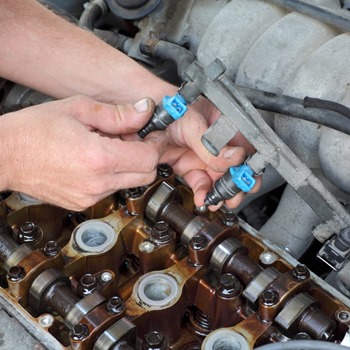 To divide fuel injector cleaners into groups, we could go into several details, comparing different features or brands of cars they cover. But there is a better way to do it. Fuel injector cleaners are famous for doing more than one good thing once you let them into the circulatory system of your vehicle. So, to make things easier, we divided them into basic fuel injector cleaners and fuel system cleaners.
To divide fuel injector cleaners into groups, we could go into several details, comparing different features or brands of cars they cover. But there is a better way to do it. Fuel injector cleaners are famous for doing more than one good thing once you let them into the circulatory system of your vehicle. So, to make things easier, we divided them into basic fuel injector cleaners and fuel system cleaners.
1. Basic Fuel Injector Cleaner
The first group covers the basic feature of cleaning the injectors. Primarily, this includes the features we talked about in this guide for the most part. A basic fuel injector cleaner has a formula that focuses on tackling grime, dirt and carbon aggregations located in or around the injectors themselves. Do not think that just because they are basic that they do not do the job well. On the contrary, these cleaners are made specifically for the task of maintaining the fuel injectors clean, no more no less.
2. Fuel System Cleaner
On the other hand, there are fuel system cleaners, which can mean a lot of things. System cleaners are known for having a wide variety of useful features, sometimes superseding the sole cleaning power with additional lubrication, fuel stabilization, or the possibility to stabilize the fuel. There are even formulas that cover all of the above, and we recommend them to people who haven’t invested in car maintenance for some time.
Long story short, when it comes to fuel injector cleaners, it would be best to keep an eye out for these smaller extra features added to the formula. It all goes down to how wide of a cleaning you want to do. With basic injector cleaners, you focus on the injectors only, with a combo cleaner you get to tackle more parts.
Fuel Injector Cleaner Buying Guide
It is time to see what sort of little things to expect on the market of fuel injector cleaners. The differences are often subtle, and can sometimes be the deciding factor. In this section, we are going to address what different bottles of injector cleaner fluid can bring to the table. We will also try to point out some useful things that can help you in the selection process.
1. The Range of Cleaning
The choice here is pretty much binary. What you have to choose between is a basic fuel injector cleaner and a fuel system cleaner. Some manufacturers make fluids that act as a bit of both, or as a limited fuel system cleaner. The thing is, either fluid will help you tackle injector clogging, but the fuel system cleaner will get to a bit deeper and clean a bit more. Both fluids will get the job done, but, if you haven’t cleaned the injection system in a while, we recommend you pick the broader range. Get a fuel system cleaner and free your injectors and another tubing from unnecessary contamination.
2. Diesel, Gasoline or Combo Fuel Injector Cleaners?
To decide which one you get, you need to know what kind of fuel your vehicle is burning in the first place. If you are unsure which injector cleaner to get, the safest bet would be to get a combo cleaner. This type of fluid does not make the difference between gasoline and diesel type engines. Now, some experts suggest that matching the type is the best course to go, but experience has shown that the difference between matching and combo cleaner is minimal. The decision is yours, as long as you remember that both types will do.
3. Formula Strength and Additives
There are no two same drivers out there. Cars get dirty and clogged up in different intensities and variations, and that is why you should also factor in your driving habits into your decision. If you are driving a lot, especially around town, then you should opt for a more potent fuel injector cleaner formula. On the other hand, if regular maintenance is all you want, there are some low-concentration solutions out there.
The other thing related to the cleaner fluid itself is additives. They are put into the final formula to enhance a different aspect of your engine. Here’s a number of most common additives you can find on the market:
- Corrosion inhibitors – every car can benefit from this, especially vehicles with diesel engines.
- Octane boosters – as the name suggest, this additive brings the explosiveness of the fuel up by a significant margin
- Lubricants – as engines are full of moving parts, they can benefit from extra lubrication as well
- Fuel stabilizers – mostly used for gasoline engines, they prolong the expiration date of the fuel
4. Bottle Size
If you are looking for a fuel injector cleaner that will last for several cleaning sessions, look for a larger package. These large bottles are usually enough to clean the injectors three to four times, depending on the vehicle size, of course. Make sure to double-check the labels and the instruction manual provided by the manufacturer, because some injector cleaning agents are more concentrated than others.
How to Use Fuel Injector Cleaners?
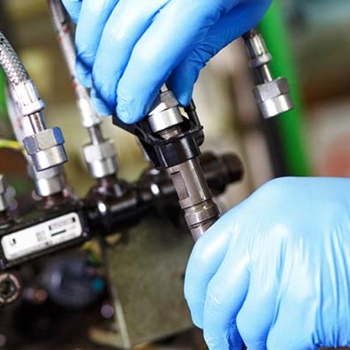 Okay, now we know everything there is about this magical fluid. It is time to walk through the actual process of using a fuel injector cleaner, along with some useful advice. Keep in mind that this process may differ slightly from car to car or cleaner brand to cleaner brand, but the core principle is pretty much the same in every case. Without further ado, here are the tips and tricks on how to use fuel injector cleaners!
Okay, now we know everything there is about this magical fluid. It is time to walk through the actual process of using a fuel injector cleaner, along with some useful advice. Keep in mind that this process may differ slightly from car to car or cleaner brand to cleaner brand, but the core principle is pretty much the same in every case. Without further ado, here are the tips and tricks on how to use fuel injector cleaners!
1. Make sure you have the right fuel injector cleaner for your car/engine type!
Even though the vast majority of fuel injector cleaners will fit any type of engine or car brand, always double-check whether there are some special notes from the manufacturer. While mismatching the cleaner type cannot cause any severe immediate damage, it can fail to help you with your current problem. So, double-check before you get a bottle, and read the label twice!
2. Read the instructions on the bottle and prepare the extra tools if needed
Some fuel injector cleaner fluids come with special instructions regarding the amount you should pour in or the procedure after you empty the bottle. Some even come with their own pouring funnels or tubes. There isn’t much to it, but it is essential to follow these particular steps, if there are any, in order to not miss out on something.
3. Empty the gas tank
Now, we are not insisting on you manually emptying the fuel tank, but it is also an option. The best timing for fuel injection, if the conditions allow it, is to do it right before you run out of fuel. The agents inside the fuel injector cleaner will work better if you pour them into an empty tank. Doing it on a full tank can still work, but it was proven to have less of an effect.
4. Turn off the car and remove the fuel cap
There are no special tips here. Makes sure that your fuel tank is accessible for the funnel or cleaner bottle to go through. And yes, do not forget to turn the engine off.
5. Get the fuel injector cleaner in!
Prepare the proper amount of the fluid and pour it inside the near-empty fuel tank. Utilize the pouring tool (funnel, tube) if the manufacturer provided any, and do not go over the recommended amount of the injector cleaner. Nothing terrible will happen if you do pour in a little more, just keep in mind that “the more, the better” doesn’t always apply.
6. Top the fuel tank
Once you’re done getting the fuel injector cleaner fluid in, refill the tank, preferably to full. With the cleaner fluid at the bottom, the fresh fuel will start mixing into the combination that will clean the insides of the fuel injection system.
7. Time to drive
Now that the process is over, it’s time to get into the driver’s seat and step on the gas. By emptying that fresh batch of fuel, you actually clean the fuel injectors while you drive. The best outcomes come from flexing your car’s engine by driving on the highway, or by revving up the engine on the parking lot. The higher the RPM, the better. Drive responsively, and enjoy the rejuvenated engine performance.
FAQ About Fuel Injector Cleaners
1. How often should I use a fuel injector cleaner?
There is not a strict rule regarding the frequency of fuel injector cleaning. Some drivers should do it more often, while others do not drive as much and have no need to do it as much. Because we cannot put a finger on a single timeframe like monthly or yearly, we will leave you with a simple time guide, depending on several factors:
- If you are an average driver when it comes to time on the road, once every 30,000 miles or once a year would be the right time to clean your car’s fuel injectors.
- If you are living in an area that is known for low-quality fuel, you should stick to cleaning every 8 to 10 months.
- If you are spending a longer-than-average time on the road, you should also continue cleaning the injectors every 8 to 10 months.
- If you opt for a heavy-duty fuel injector cleaner, you should do it once a year.
- Lastly, if you haven’t driven in a while, we suggest you drain the tank and run some fuel injector cleaner through the system.
So, those three things are the most important to balance when it comes to how often you need to clean: road time, fuel quality, and fuel injector cleaner strength.
2. Can I use a different fuel injector cleaner from the one I used before?
Some time ago, people used to think that this practice is bad for the car, or that it will somehow clog the injectors even worse. Nowadays, we know that that concern was pointless. The truth is that you can use another type/brand of fuel injector cleaner freely. Just bear in mind that you need to use the proper amount, and you need to clean it as the manufacturer prescribed.
The old and the new fuel injector cleaner will not counteract each other’s benefits, so there is no need to worry about damages, as drivers used to before.
3. Can I improve engine ignition during the winter by cleaning the fuel injectors?
Not only that you will be able to enhance your car’s starting sequence, but it is recommended to do it before winter. This goes especially to diesel car owners. Diesel cars struggle pretty bad to start during the winter, and a clean fuel injector just might do the trick. Just remember to dose it properly, and to execute the cleaning with caution.
4. Do I need a professional to clean car’s fuel injectors?
The short answer is: it depends! These fuel injector cleaners are made with ease of use in mind. You do not have to do much. As we mentioned above, a few simple steps and a test drive will do the trick. However, if you went through one or two cycles or fuel injector cleaning, and the car is still acting up, it is time to let it go to the professionals.
Car mechanics have different methods of fuel system cleaning. It usually requires them to open the engine approach to the fuel injection systems more directly. Sometimes, it just so happens that your vehicle’s fuel injectors are busted and need a replacement, and no amount of fuel injector cleaner will do the trick.
So, if you are unsure whether the fuel injection system cleaning worked or not, or the car just doesn’t feel right, take it to a professional and let them have a go. And if the gas mileage returns after you pour it in, the fuel injector cleaner did its magic.
Wrap Up
There you have it, a guide to help you decide upon the best fuel injector cleaner for your vehicle. We realize that there is a lot to read through and that this concept was maybe unknown to you up until now. But we learn as long as we breathe, and we are sure that this knowledge will save you countless hours of figuring out what’s wrong. Besides, not every little thing requires a professional’s help. Some issues can be resolved by simple cleaning.
We encourage you to use our guide as a checklist that will help you in deciding which fuel injector cleaner to get. After studying it, check out suggestions from the fuel injector clear reviews, and decide which one will help you with restoring your vehicle to its former glory. If you have anything to add or ask us, contact us and we will answer as soon as possible.